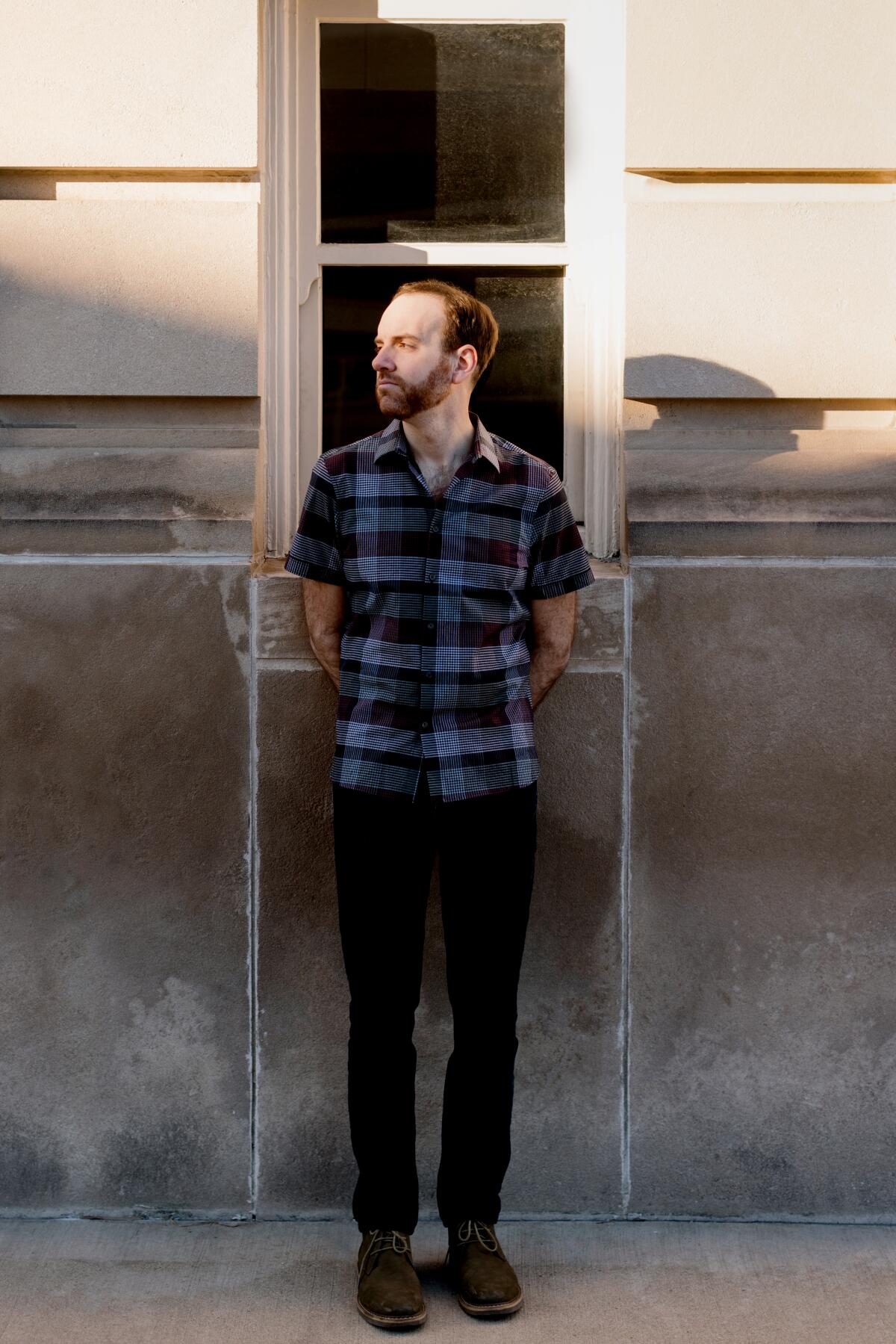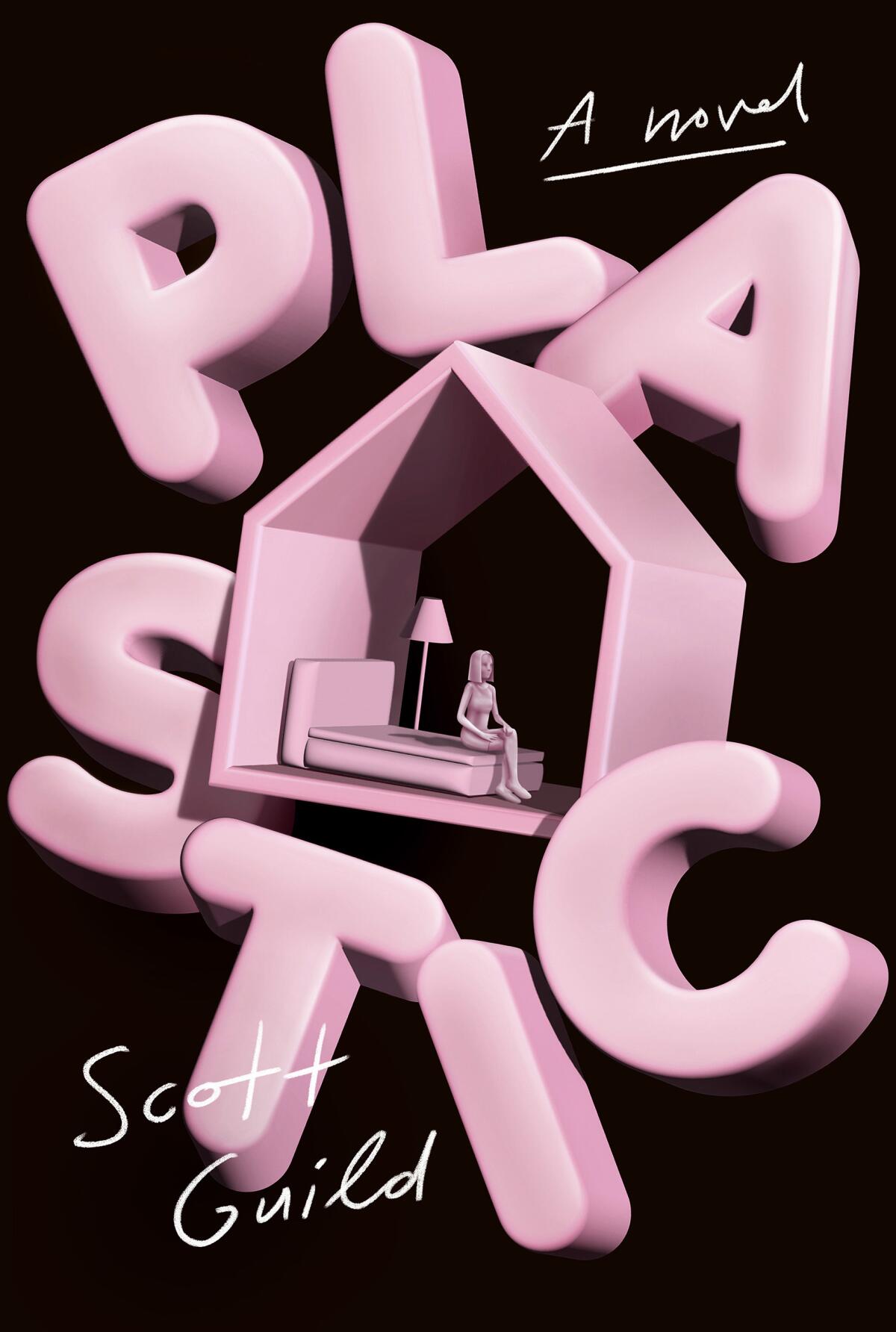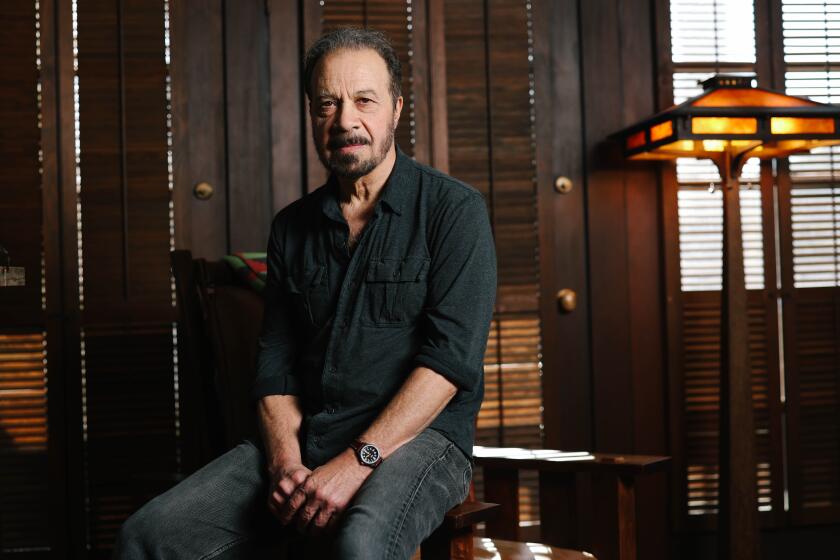Life is ‘Plastic’ in Scott Guild’s novel and companion album

- Share via
On the Shelf
Plastic
By Scott Guild
Pantheon: 304 pages, $28
If you buy books linked on our site, The Times may earn a commission from Bookshop.org, whose fees support independent bookstores.
Scott Guild’s debut novel, “Plastic,” is a dark and entertaining saga about a postapocalyptic world populated by plastic figurines, dominated by inescapable advertising, in thrall to virtual reality and fearful of increasing acts of eco-terrorism as well as government clampdowns.
Scott Guild’s first solo album, “Plastic,” is a dark and entertaining saga about a postapocalyptic world populated by plastic figurines, well, you get the point.
“Plastic” is that rarest of publishing experiences, a story being released simultaneously in prose and music. (The most notable previous effort was “Run, Rose, Run,” by Dolly Parton and James Patterson, which lacked Guild’s literary ambitions.)
“It wasn’t like I sat down and said, ‘I’ll write a book about plastic figurines that is also an album.’ It was one idea followed by another and another for a full decade of brainstorming and stopping and starting,” Guild says.
To anyone who knows Guild’s previous life as the songwriter and guitarist for New Collisions, an indie rock band that was gaining a following about 15 years ago, this combo might seem a natural fit, but for Guild, who thought he had walked away from music forever, the album was a total surprise.
“The dream of being a musician was beautiful to me, but I couldn’t hack it in a lived day-to-day way,” Guild recalls. “The band was doing really well but the touring was intense and I was just in this loop of writing about my anxieties over and over again — an anxious person writing about his anxieties became too anxious to keep doing it. I needed to salvage my sanity.”

Guild found a solution in writing fiction, ultimately earning an MFA and a PhD while working on the novel that became “Plastic.” “This is where my life makes sense,” he said. He and his wife, Rachel Cochran, are both English professors at Marian University in Indianapolis, where he did this video interview, sitting in front of a large print of Picasso’s “Guernica” — fitting considering the death and destruction in the novel.
Despite the subject matter, the novel isn’t relentlessly grim, though Guild says it started out that way. In its first incarnation, as “Dead Limbs,” it was “a very unfun read filled with sad, serious, contemporary problems like gun violence and climate change.”
Guild notes that Picasso painted “Guernica” not out of fatalism but “to wake people up to the horror around them. Any time you’re creating something to render what your current moment truly is, it’s actually a hopeful act, a belief in community, that others will understand and share the same concerns.”
So Guild knew he’d need to reimagine his book to breathe life into it. After a two-year break, he hit on the idea of plastic figurines instead of people, drawing inspiration from “Barbie.” He was watching a horror movie years earlier when a friend arrived with young children. Someone quickly hit the remote to change the channel and a low-budget, badly animated “Barbie” show popped up. “A door opened in my mind then and so many other things became possible,” Guild says.
The multiple traumas that the protagonist, Erin, experiences in “Plastic” cause her to think of her life from a distance, so we read the action as if there’s a camera filming her experiences. She occasionally narrates and even talks to the camera as if in a mockumentary; she also obsesses over a sitcom in her world, filled with characters that are waffles, including a MAGA-like president and a Christ figurine named Morris who dispenses dubious advice — this show is ultimately revealed to be another coping device for Erin.
Have you heard the anecdote about Harvey Weinstein? Or Julia Roberts? Or Matthew Broderick’s mother? Director Ed Zwick explains why he goes there in ‘Hits, Flops, and Other Illusions.’
“Many of us cope by having these different parts of ourselves,” Guild says. “But it was only once I made the characters plastic I started understanding how to make the book more imaginatively alive.”
The book’s editor, Anna Kaufman, notes that the novel changed dramatically after the publisher bought it. “Scott had so many imaginative ideas so we had to figure out what to cut and what to accentuate and the rules of the world of the book,” she says.
The songs arrived late in the game. “I was writing a scene one day and a character burst into song,” Guild says. He realized that when Erin is at her most dissociative and feeling her most heightened emotions, she would imagine her world as a musical. “So I asked Anna, ‘What if I filled this book with musical numbers?’ And we were in a playful space with it so she said yes.”
Eventually, Guild stepped back and looked at the lyrics and wondered what they would sound like as songs. So he reached out to musician Jonny Rodgers about creating a concept album to tell the same story in music.
Rodgers, who co-wrote and co-produced the album, said they didn’t just lift the lyrics off the page. “We used them as a jumping-off point, but those were her first-person experiences and we wanted the album to be a realization of the entire world,” Rodgers says.
In the novel, contemporary music for the plastic folk is things like corks popping and plane sounds, but that would have been too alien for human listeners. “We wanted to make the music accessible but also both futuristic and nostalgic, the way Erin is,” Rodgers says. “I have a proclivity toward using orchestral music in strange ways. So I reached back to the ’80s, the most plastic music ever, for synthesizers and then used the orchestral tendrils as reality creeping into her plastic world.”
Pantheon’s marketing director, Julianne Clancy, says the album is not a gimmick but a “natural overlap” and that they will use playlists to promote the book. And publicist Demetri Papadimitropoulos oversaw a unique book tour, with live music performances in many venues; he also notes that the audiobook is distinctive, with musical excerpts from the album throughout and two full songs at the end to heighten the connection.
Guild hopes readers and listeners find that the two projects intertwine and enhance one another, but he also believes each stands alone successfully. “It’s so exciting that out of this novel I was suddenly able to reconnect back to music and it felt so organic,” he says. “I wasn’t looking for a way to get back to it, it was like the book just said to me, ‘Hey, I can be an album too.’ It was so healing and such a full-circle moment for my life. It was almost a magical experience.”
Guild will be discussing his new novel at Chevalier’s Books in L.A. on Feb. 20 at 6 p.m. The conversation (with writer Ilana Masad) will be followed by a musical performance by Cindertalk, an audience Q&A and book and vinyl signing.
More to Read
Sign up for our Book Club newsletter
Get the latest news, events and more from the Los Angeles Times Book Club, and help us get L.A. reading and talking.
You may occasionally receive promotional content from the Los Angeles Times.










